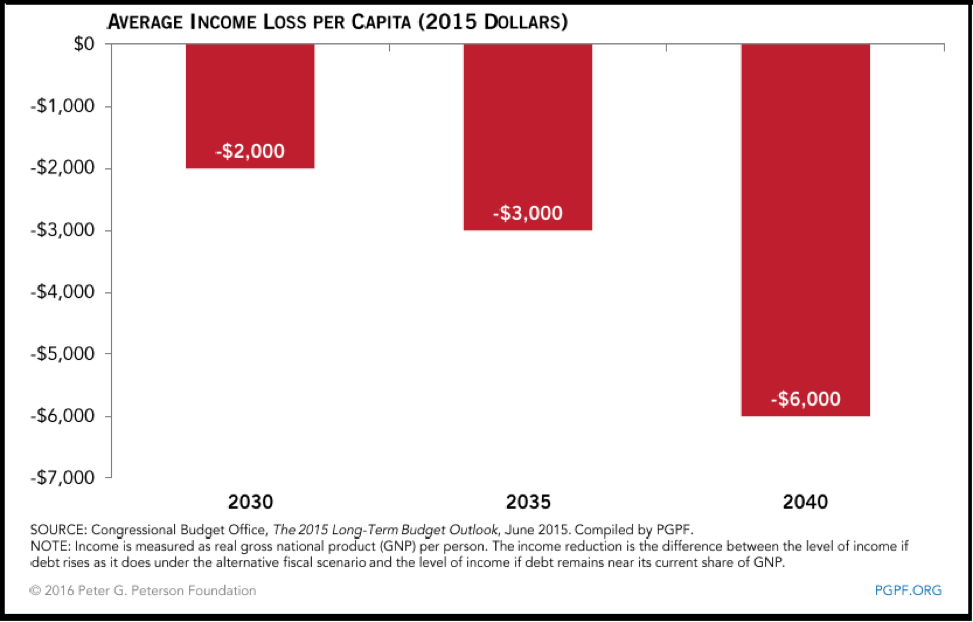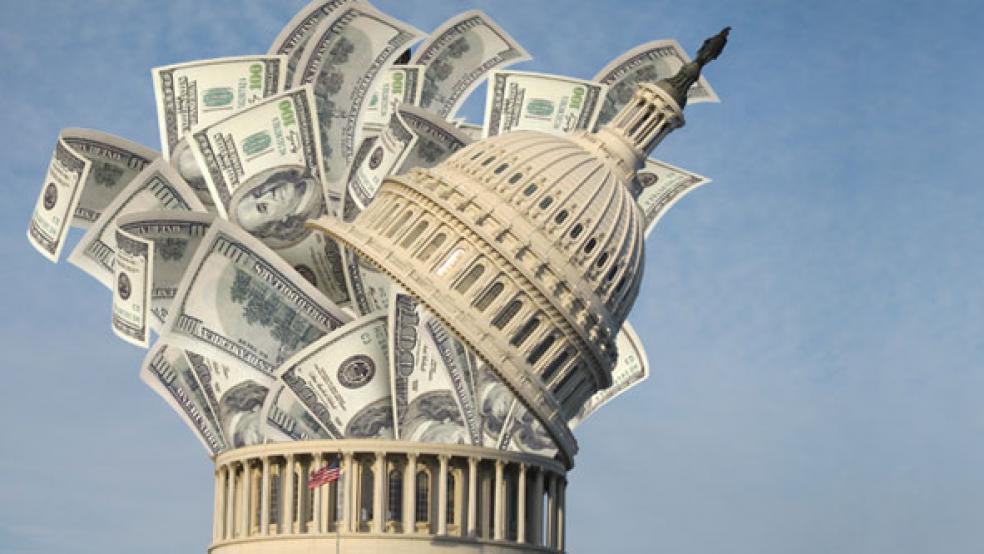To say that the Republican primary fight overshadowed the stunning news of America’s first four-trillion-dollar budget almost trips over the point. The rhetoric leading up to the New Hampshire primary offered plenty of debate over repetition in political messaging, the relative merits of executive experience versus transformational activism, and the authenticity of various Republicans in the field.
Most of those themes continued to play out Tuesday, while almost no one noticed that President Barack Obama used the foofaraw of primary day coverage to release his proposed FY2017 budget, with $4.1 trillion in spending and more ballooning of the deficit and national debt.
Related: As National Debt Hits $19 Trillion, a Spending Showdown Looms in Congress
About the only mention of the federal budget came in the post-primary speech from Donald Trump, who crushed his competition in the Granite State – and even that was in reference to the previous year’s budget. “I mean, what's going on? What's going on? The budget,” Trump said near the end of his speech. “The last budget that was approved is an absolute disaster for everybody in this country. We owe $19 trillion as of today. We just crossed the $19 trillion mark. We're going to very shortly be at $21 trillion because of the budget."
It might come sooner than Trump thinks. According to the Office of Management and Budget, as reported by USA Today, the new proposal increases the deficit to 2.8 percent of annual GDP. That will push the national debt from its current $19 trillion, as Trump accurately stated, to $27.4 trillion by the end of the decade. And even that rests on a number of highly questionable assumptions regarding federal spending and revenues.

For instance, those numbers include Obama’s proposed $10-per-barrel oil tax, intended to cover the cost of new green-energy initiatives, funding for which Obama doubles in this proposal. Washington hasn’t been able to enact immigration reform for over a decade after the 9/11 Commission urged it as a national-security issue, but Obama’s budget assumes it as a fait accompli – and counts on $170 billion in new revenue from its passage. As ISIS continues to metastasize and threaten American and regional interests, the budget foresees the ability to cut war funding by over $600 billion in the next ten years. It also envisions $2.8 trillion in tax hikes in the same period, double the amount Obama sought last year and failed to win.
Related: Why Is the Government Spending $310 Billion on ‘Unauthorized’ Programs?
This budget – like others from Obama during his presidency – will go nowhere. Speaker Paul Ryan of the Republican-controlled House, made it clear that it will be dead on arrival. “This isn't even a budget,” Ryan said, “so much as it is a progressive manual for growing the federal government at the expense of hardworking Americans.”
Put aside the components of the budget, though, and focus more on the astounding expansion of it during the years in which Obama controlled the outcomes of the budget. The final federal budget signed by a Republican president was FY2008, when Democrats negotiated with George W. Bush on the spending plan. For FY2009, Democrats passed a series of continuing resolutions to exclude Bush from exercising his authority on the budgets, delaying it until Obama could sign an omnibus bill in March 2009 to complete the budget process.
In FY2008, the federal government had outlays of $2.98 trillion, amounting to slightly over 20 percent of GDP for 2008. By FY2015, outlays had risen nearly 24 percent, while economic output during the same period rose only 10.1 percent. The population grew only 5.3 percent in the same period. The FY2016 budget pushed the increase in outlays to 32.4 percent of the FY2008 budget, nearly a third more spending in just eight years and an increase of 7.1 percent over the previous year – when the economy grew at only 2.4 percent.
Those who claim to be mystified by the rise of anti-establishment populist fervor need look no further than this. While spending has escalated out of control, more and more evidence emerged that Americans hardly got their money’s worth out of it. The Veterans Administration paid itself massive bonuses based on widespread fraud that cost veterans their lives. China hacked into the Office of Personnel Management’s computers and stuck around a year or more before anyone knew about it.
Related: Sharp Divide Over Spending and the Debt Could Renew Budget Warfare
Despite having more than three years and a half-trillion dollars to set up the kind of online insurance portal that private-sector firms had used for years, HHS’ implementation of Obamacare turned into its own disaster. ISIS went from being “jayvees” to sweeping across Syria, Iraq, and Libya, creating a terrorist quasi-state while the US appeared incapable of dealing with the crisis.
The budget and its deficit has special resonance for voters, however. Obama knew this in 2008 when he accused George Bush of being “unpatriotic” for adding $4 trillion to the national debt in eight years. Obama has added ten trillion dollars to the national debt in the same time, and his latest budget proposal would make that worse even if he got all of the tax hikes it contains.
Younger voters are especially sensitive to this. While conducting research for my book Going Red in New Hampshire in 2015, I spoke with a young man who had cast his first two presidential votes for Obama. Recently, though, the rapid increase in national debt has frightened him – as does Obama’s insistence that the proper response is to spend more. “It needs to be fixed,” he told me.
Related: Clinton Attacks Sanders’ $14 Trillion Health Plan as ‘Wishful Thinking’
But where are the proposals to scale back the budget and eliminate deficits? Neither party in Washington has seriously proposed a plan to fix this, which means younger voters will inherit the fruits of their parents’ and grandparents’ profligacy. Both parties have contributed to the rapid increase of federal spending. That leaves voters with few choices but radical disruptors such as Donald Trump and Bernie Sanders, or maybe Ted Cruz or Marco Rubio, as outsiders willing to take on entrenched interests to end the debt cycle and get back to fiscal responsibility.
Barack Obama’s budget gives the populists four trillion reasons to demand systemic change. The eventual budget agreement will only offer an incremental – and likely very small – reduction of that number. If the electorate has begun toting pitchforks and torches, America’s political leadership has only itself to blame.






